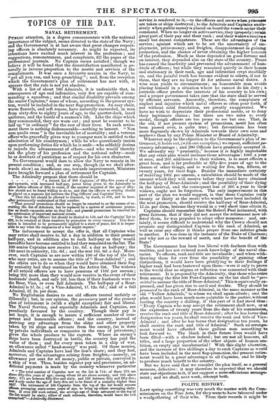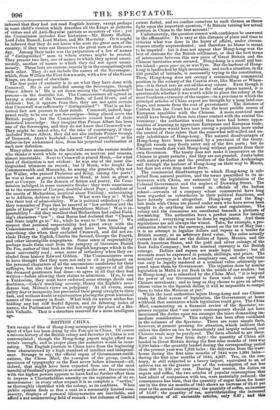POLITE HISTORY.
Leer spring something was very much thearratter with the Com- missioners on the Pine Arts, for theyseeneto have heboured under a woolgathering of 'their wits. Prom their records it might be
inferred that they had not read English history, except perhaps in some child's version which describes all the Kings as patterns of virtue and all Anti-Royalist patriots as monsters of vice : yet the Commission includes four historians—Mr. Henry Hallam, Lord John Russell, Lord Mahon, and Mr. Macaulay. Or it might be inferred that they do not know who were the great men of the country, if they were not themselves the great men of their own day. Among their tasks was the preparation of a list of names of ' distinguished" men to whom statues might be erected. They present two lists, one of names to which they agreed unani- mously, another of names to which they did not agree unani- mously. These lists are curious, especially in the comparison;with each other. They do not include the names of the Sovereigns ; which, from William the First downwards, with a few of the Saxon Kings, are disposed of elsewhere.
The first point of curiosity is to see what they have done with Cromwell. He is not included among the Sovereigns, though Prince Albert is ! He is set down among the " distinguished" persons—in the doubtful list. The Commissioners all agreed in having a statue of the Venerable Bede, of Lord Howe, and of Addison ; but, it appears from this, they are not quite certain that Cromwell was sufficiently "distinguished"! That is an his- torical fact not present to their minds. Cromwell, indeed, hap- pened really to be one of our Sovereigns—being placed sovra the British people ; but the Commissioners cannot boast of their historical knowledge : they imagine that Prince Albert has been one of the Sovereigns, and they do not know that Cromwell was. They might be asked why, for the sake of consistency, if they included Prince Albert, they did not also include Prince George of Denmark, Anne's-husband—honest "Est-il possible?" as his father-in-law nicknamed him, from his perpetual exclamation at each new defection.
Many other anomalies in the lists will amuse the curious reader who thinks it worth while to speculate on motives and reasons, almost inscrutable. Next to Cromwell is placed Monk,—for what kind of distinction is not evident : he was one of the most dis- tinguished trimmers on record ; but if Monk, who fought for Commonwealth and Monarchy, be among the generals, why not put Waller, who praised Protector and King, among the poets? he was at f n-east as great a trimmer as Monk, at least as great a poet as Cowper. In the domain of fiction and poetry, the Com- mission indulged in some excessive freaks : they were unanimous as to the eminence of Cowper, doubtful about Pope ; confident of the merits of Richardson, sceptical about Fielding ; unhesitating as to Addison, dubious as to Burns. What were they at ? What was their test of admissibility. Was it political orthodoxy?—did they remember of Pope that he sneered at " low ambition and the pride of kings " ? and why admit Republican Milton? Was it re- spectability?—did they recollect that Richardson had called Field- ing's characters "low " ; that Burns had declared that " Church and State might go to " &c., while he went to " his Anna "? We suspect that personal respectability had great sway with the Commissioners ; although they must have been thinking of something else when they excluded Cromwell, and did not ex- clude Henry the Eighth, Charles the Second, George the Fourth, and other incorrigible scapegraces. Some sense of respectability perhaps made them omit from the category of literature Daniel De Foe, author of that book in the Englishlanomage which is the most universally read ; some sense of orthodoxy when they ex- cluded from history Edward Gibbon. The Commissioners seem to have thought that they were not only to sit injudgment on the personal characters of all the unconscious candidates for their suffrages, but also that they were bound to approve of all that the deceased gentlemen had done—to agree in all that they had written—before allowing their claims to admission. If so, to use a Yankeeism, they must have endorsed some strange deeds and doctrines,—Coke's truckling severity, Henry the Eighth's mur- derous lust, Milton's views on polygamy. At all events, some paltry fear or incapacity has prevented their going straight to their task, and without doubt or equivocation placing the great historical names of the country in front. What with its narrow niches for- bidding any but stiff feudal figures, and its faltering index of names, the Parliament Palace will not supply the place of a Bri- tish Valhalla. That is a structure reserved for a more intelligent age.



























 Previous page
Previous page